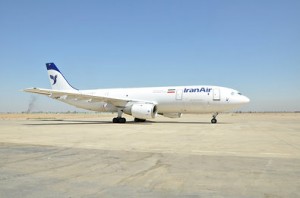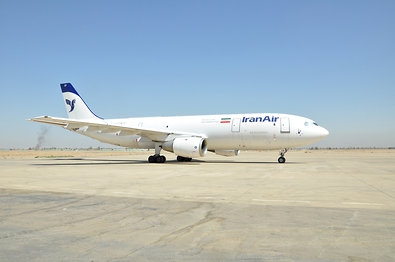 WASHINGTON � The American effort to stem the flow of Iranian arms to�Syria�has faltered because of�Iraq�s reluctance to inspect aircraft carrying the weapons through its airspace, American officials say.
WASHINGTON � The American effort to stem the flow of Iranian arms to�Syria�has faltered because of�Iraq�s reluctance to inspect aircraft carrying the weapons through its airspace, American officials say.The shipments have persisted at a critical time for President�Bashar al-Assad�of Syria, who has come under increasing military pressure from rebel fighters. The air corridor over Iraq has emerged as a main supply route for weapons, including rockets, antitank missiles, rocket-propelled grenade and mortars.
Iran�has an enormous stake in Syria, which is its staunchest Arab ally and has also provided a channel for Iran�s support to the Lebanese Islamist movement Hezbollah.
To the disappointment of the Obama administration, American efforts to persuade the Iraqis to randomly inspect the flights have been largely unsuccessful.
Adding to American concerns, Western intelligence officials say they are picking up new signs of activity at sites in Syria that are used to store chemical weapons. The officials are uncertain whether Syrian forces might be preparing to use the weapons in a last-ditch effort to save the government, or simply sending a warning to the West about the implications of providing more help to the Syrian rebels.
�It�s in some ways similar to what they�ve done before,� a senior American official said, speaking on the condition of anonymity to discuss intelligence matters. �But they�re doing some things that suggest they intend to use the weapons.�It�s not just moving stuff around. These are different kind of activities.�
The official said, however, that the Syrians had not carried out the most blatant steps toward using the chemical weapons, such as preparing them to be fired by artillery batteries or loaded in bombs to be dropped from warplanes.
Regarding the arms shipments, Secretary of State Hillary Rodham Clinton secured a commitment from Iraq�s foreign minister in September that Iraq would inspect flights from Iran to Syria. But the Iraqis have inspected only two, most recently on Oct. 27. No weapons were found, but one of the two planes that landed in Iraq for inspection was on its way back to Iran after delivering its cargo in Syria.
Adding to the United States� frustrations, Iran appears to have been tipped off by Iraqi officials as to when inspections would be conducted, American officials say, citing classified reports by American intelligence analysts.
Iran�s continued efforts to aid the Syrian government were described in interviews with a dozen American administration, military and Congressional officials, most of whom requested anonymity to discuss intelligence matters.
�The abuse of Iraqi airspace by Iran continues to be a concern,� an American official said. �We urge Iraq to be diligent and consistent in fulfilling its international obligations and commitments, either by continuing to require flights over Iraqi territory en route to Syria from Iran to land for inspection or by denying overflight requests for Iranian aircraft going to Syria.�
Iraqi officials insist that they oppose the ferrying of arms through Iraq�s airspace. They also cite claims by Iran that it is merely delivering humanitarian aid, and they call the American charges unfounded.
�We wouldn�t be able to convince them, even if we searched all the airplanes, because they have prejudged the situation,� Ali al-Musawi, the spokesman for Prime Minister Nuri Kamal al-Maliki of Iraq, said of the American concerns. �Our policy is that we will not allow the transfer of arms to Syria.�
Mr. Musawi acknowledged that one of the planes was not inspected until it was returning from Damascus, but said it was a simple error, not a deliberate effort to help the Iranians. �Mistakes sometimes occur,� he said.
But one former Iraqi official, who asked not to be identified because he feared retaliation by the Iraqi government, said that some officials in Baghdad had been doing the bare minimum to placate the United States and were in fact sympathetic to the Iranian efforts in Syria.
The Iranian flights present challenges for the Obama administration, which has been reluctant to provide arms to the Syrian rebels or to establish a no-fly zone over Syria for fear of becoming entangled in the conflict. They also illustrate the limits of the administration�s influence with the Maliki government and point to divergent foreign-policy calculations in Washington and in Baghdad.
While Iraq�s actions clearly benefit Iran, a Shiite country with close ties to many Iraqi officials, Mr. Maliki may have his own reasons to tolerate the flights.
Mr. Maliki, American officials say, is worried that if Mr. Assad falls from power it may embolden Sunni and Kurdish forces in the region, including in Iraq, which could present challenges to his Shiite-dominated government.
Iran�s support for Syria is vital to the Assad government, American officials said. In addition to flying arms and ammunition to Syria, Iran�s paramilitary Quds Force is sending trainers and advisers, sometimes disguised as religious pilgrims, tourists and businessmen, the officials say.
Iran�s flights of arms to Syria drew the concern of American officials soon after the withdrawal of American forces from Iraq last December. Iraq lacks an air force and is unable to enforce control of its own airspace, and Iran took advantage by ferrying arms to Syria.
Under American pressure, Iraqi officials persuaded the Iranians to hold off on the flights as Iraq prepared to host the Arab summit in Baghdad in March. Soon after the meeting,President Obama, in an April 3 call to Mr. Maliki, underscored that the flights should not continue.
But after a bombing in Damascus in July that killed ranking members of Mr. Assad�s government, the Iranian flights resumed. Vice President Joseph R. Biden Jr. raised American concerns over the flights in an Aug. 17 phone call with Mr. Maliki. So did Denis McDonough, Mr. Obama�s deputy national security adviser, who met with Mr. Maliki in Baghdad in October.
When Mr. McDonough raised concerns over the inspection of the plane that was on its way back to Iran, Mr. Maliki responded that he was not aware that the inspection had been carried out that way, according to one account of the meeting by an American official. A spokeswoman for the National Security Council declined to comment.
There is evidence of collusion between Iranian and Iraqi officials on the inspections, according to American intelligence assessments. In one instance, according to an American intelligence report, Qassim Suleimani, the leader of Iran�s Quds Force, ordered that a flight to Syria carry only humanitarian goods. An Iraqi inspection occurred soon after, when the plane was asked to land in Iraq on Oct. 27.
Much of the American intelligence community�s concerns about possible collusion has focused on Hadi al-Amiri, Iraq�s minister of transportation, who is believed to be close to the Iranians and was among the Iraqi traveling party when Mr. Maliki visited Washington last year. Mr. Amiri said: �This is untrue. We are an independent country and our stance is clear. We will search whichever plane we want, whenever we want. We will not take orders.�
Nasir Bender, the head of civil aviation in Iraq, said there was no indication that Iraqi officials had tipped off the Iranians. �We have orders to search any plane that we feel is suspicious, but the ones we have searched were only carrying medical supplies and clothing,� he said, adding that the Iraqis had inspected only two Iranian flights because of the cost of fuel. �We can�t search every plane because there are so many heading to Syria,� he said. �It would be a big waste of money. Each plane we take down we must refill with fuel.�
In one instance in late October, however, an Iranian flight ignored an Iraqi request that it land, according to American intelligence assessments, presumably because the Iranians did not want its cargo to be inspected.
Iraq�s attitude toward the Iranian flights has drawn the concern of lawmakers on Capitol Hill, including Senator John Kerry, the Massachusetts Democrat who has been mentioned as a possible secretary of state in Mr. Obama�s second term.
�If so many people have entreated the government to stop and that doesn�t seem to be having an impact,� Mr. Kerry said in September, �that sort of alarms me a little bit and seems to send a signal to me maybe we should make some of our assistance or some of our support contingent on some kind of appropriate response.�
The activity at the Syrian chemical weapons sites, described by American, European and Israeli officials, poses an additional challenge for the West. The senior American official confirmed on Saturday that in the past two or three days, United States and allied intelligence have detected that the Syrian military was carrying out some kind of activities with some of its chemical stockpiles.
Since the crisis began in Syria, the United States and its allies have stepped up electronic eavesdropping and other surveillance activities of the sites.
By The New York Times
The Iran Project is not responsible for the content of quoted articles.











